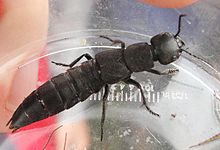Staphyliniformia is a large infraorder of beetles. It contains over 70,000 described species from all regions of the world. Most species occur in moist habitats - various kinds of rotting plant debris, fungi, dung, carrion, many live in fresh water.
| Staphyliniformia Temporal range:
| |
|---|---|

| |
| Devil's coach horse beetle, Ocypus olens | |
| Scientific classification | |
| Domain: | Eukaryota |
| Kingdom: | Animalia |
| Phylum: | Arthropoda |
| Class: | Insecta |
| Order: | Coleoptera |
| Suborder: | Polyphaga |
| Infraorder: | Staphyliniformia Lameere, 1900 |
| Superfamilies | |
|
See text. | |
Characteristics
editMost Staphyliniforms are small to average sized beetles. The diverse group has few clear apomorphies. They have primitively 11-segmented antennae, a constricted neck well behind the eyes. The pronotum has a well defined, large lateral edge. Larval legs are 5-segmented, the 10th abdominal segment is often with more-or-less fine or strong spines or hooks. Urogomphi (paired "horns" at posterior tip of abdomen of larvae and pupae) with basal articulation.[1]
Systematics and evolution
editStaphyliniformia belongs to the suborder Polyphaga and is usually given an infraorder or series rank. It contains three superfamilies:
- Histeroidea, including the clown beetles.
- Hydrophiloidea, including the water scavenger beetles
- Staphylinoidea, including antlike stone beetles, carrion beetles, and rove beetles.
Some recent studies also include the superfamily Scarabaeoidea (infraorder Scarabaeiformia), forming together the so-called Hydrophiloid lineage.[2][3] A sister group relationship of Hydrophiloidea and Histeroidea is strongly supported.[4]
The unambiguous fossil record dates back to Triassic, and an early Mesozoic origin of the group is probable.[5]
See also
editReferences
edit- ^ M.Hansen. Phylogeny and classification of the staphyliniform beetle families (Coleoptera). Biologiske Skrifter 48, Copenhagen, 1997
- ^ M.S.Caterino et al., On the constitution and phylogeny of Staphyliniformia (Insecta: Coleoptera). Molecular Phylogenetics and Evolution Vol.34, 3, 2005
- ^ J.Kukalova-Peck, J.F.Lawrence, (1993) Evolution of the hind wings in Coleoptera. Canadian Entomologist, 135, 181–258.
- ^ R.G.Beutel, R.A.B.Leschen, Phylogenetic analysis of Staphyliniformia (Coleoptera) based on characters of larvae and adults. Systematic Entomology (2005), 30, 510–548
- ^ Grimaldi, D. and Engel, M.S. (2005). Evolution of the Insects. Cambridge University Press
- Data related to Staphyliniformia at Wikispecies